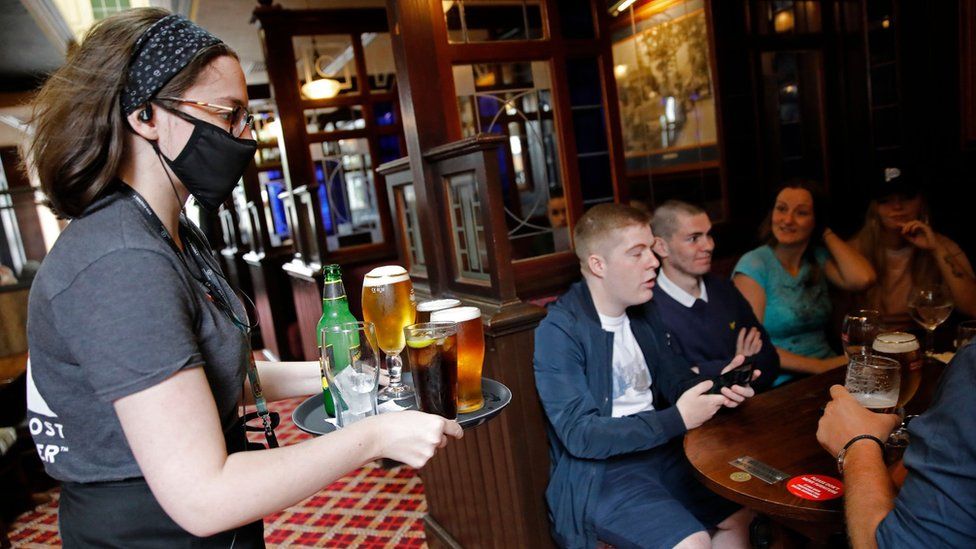Rishi Sunak to unveil new rescue deal for jobs and firms
- Published

Chancellor Rishi Sunak is to unveil new support for workers and firms hit by restrictions imposed as coronavirus cases rise across the UK.
He is due to update the Job Support Scheme, which replaces furlough in November, in the Commons on Thursday.
Critics say not enough is being done for firms in tier two areas that have seen demand collapse without being formally required to shut.
In tier three areas, firms ordered to shut get emergency support.
Talks were held throughout Wednesday, with the government said to have acknowledged that while there are three tiers of alert level - medium, high, and very high - there are only two tiers of support.
Businesses in tier two areas, particularly in the hospitality sector, have complained that they would be better off if they were under tier three restrictions. They argue that although they would be forced to close, they would benefit from greater government support.
Top London-based chef Yotam Ottolenghi said conditions for his restaurants were "terrible".
"We are on our knees now," he told the BBC. "We just don't have customers coming through the door."
He said that before tier two restrictions were imposed in London, his restaurants were operating at 50% of capacity, but that this had now fallen to between 10% and 20%.
"This is just not a viable place for a restaurant to be," he said, describing tier two as a "cursed" category that "deprives us of oxygen".
In tier three areas, the government will pay 67% of affected workers' wages, up to £2,100 a month, from 1 November ("lockdown Job Support Scheme" in the chart below). Some workers can also claim Universal Credit.
But in tier two regions, the only help available will be the standard JSS ("part-time Job Support Scheme" in the chart below), which is more costly for employers.
Business groups and unions say this means many firms will not be able to use it and will have to lay off workers instead.
The chancellor's spokesperson said: "What we have always said is that our package of support is always flexible, and always up for review, to make sure that it is dealing with the situation as it evolves."
Areas in tier two - the second-highest risk level - include London, Essex, much of the West Midlands, Leicester, Nottinghamshire, Cheshire, West Yorkshire and north-east England.
Coventry is to move to tier two Covid restrictions from midnight on Friday, the city council has said.
In addition to national restrictions meaning pubs and restaurants must close by 22:00, people in tier two areas are banned from mixing with other households indoors - hammering demand in many leisure industries.
Key Conservative figures, such as West Midlands Mayor Andy Street, have been critical of the disparities, along with a raft of Labour local leaders and MPs.
Can your finances cope?
Furlough and redundancy are cutting incomes - and millions of people's finances are not in a position to cope.
Some 12 million people in UK have low financial resilience - meaning they find it hard to pay bills or make loan repayments, according to research by the City regulator, the Financial Conduct Authority.
It found that those from a black and minority ethnic background have been more likely than most to be affected by Covid-related falls in income, with 37% of those surveyed taking a hit.
Also, people aged between 25 and 34 were the most likely, by far, to have had a change in employment as a result of the pandemic.
That has led thousands of people to take payment "holidays" - deferrals on household bills such as rent or energy bills.
From 31 October, anyone who arranges a break on repayments of mortgages, loans and credit cards will see their credit record marked - potentially making it harder to borrow more from then on.
Paul Johnson, director of the Institute for Fiscal Studies, told the BBC it was "one of the oddities of the system" that pubs and restaurants in tier three areas which had been forced to close were in a better position than those in tier two areas which remained open.
"You get full support, whereas if you're in tier two, you get no more support than similar businesses in the rest of the country and yet demand for your products is clearly massively reduced," he added.
Mr Johnson said it was clearly right that the government should seek to close that support gap with new measures.
Torsten Bell, chief executive of the Resolution Foundation, told the BBC: "We have a big distinction between tier one, tier two and tier three restrictions in theory, but the economic support packages don't go alongside those restrictions."
People in Barnsley town centre react to tier three restrictions being announced
As more parts of the country are placed in tier two, critics say the standard JSS is likely to fall short, with many fewer firms than expected signing up.
Options being discussed in Whitehall include more generous taxpayer wage support for businesses in these regions, up from the current level of 22%, and grants offered through local authorities.
With so much of England now in tier two, even small increases in support could end up being very expensive. Business and union leaders will be briefed on the changes on Thursday.
England Covid-19 tiers: Laura Foster explains the rules
It comes amid warnings that unemployment could rise as high as 8.5% in the first half of next year without more government support for struggling businesses.
In the three months to August, redundancies rose to their highest level since 2009, the Office for National Statistics (ONS) said.
The number claiming work-related benefits, meanwhile, hit 2.7 million in September - an increase of 1.5 million since the beginning of the crisis in March.
- Published22 June 2021
- Published14 December 2020
- Published9 October 2020
- Published13 October 2020
- Published24 September 2020